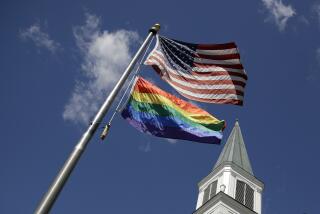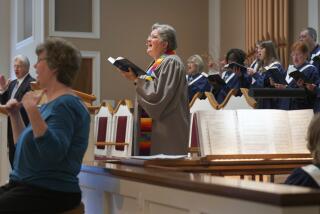Evangelical Lutherans Adopt Anti-Racism Measures : Activism: Convention delegates label bias a sin and affirm plan to increase the church’s minority membership. The young denomination also takes steps to further shape its emerging identity.
- Share via
Delegates to the Evangelical Lutheran Church in America’s Churchwide Assembly are calling on church members to confront the “prejudice, power and privilege” that combine to make up the “sin” of racism.
And they overwhelmingly reaffirmed the church’s own controversial affirmative action plan aimed at ensuring that at least 10% of the voting members in all church governing bodies are “persons of color” or those whose primary language is other than English.
The call, contained in a wide-ranging social statement, “Freed in Christ,” was the last major action of the 1,037 voting members of the assembly in Kansas City, Mo. The eight-day meeting ended Wednesday.
Together with a similar statement on the environment, the young, mainline Protestant denomination formed by the 1988 merger of three Lutheran bodies, is slowly putting in place the framework for social and political advocacy by the 5.2-million-member denomination, the nation’s fourth-largest Protestant body.
The statement on racism was adopted Tuesday on an 870-60 vote after two hours of debate and parliamentary wrangling.
It affirms a biblical vision of “one humanity, created by God” while confessing human sinfulness: “We fall back into enslaving patterns of injustice.”
The statement calls racism “a mix of power, privilege and prejudice” that is sin and that denies “the truth that all people are God’s children and . . . persons of dignity.”
The statement also reaffirms the denomination’s goal of 10% minority membership by the year 2000. It calls for ongoing support for the church’s multicultural ministries and public policy efforts aimed at eliminating racial and ethnic discrimination.
The young church also took steps to further shape its identity by adopting a broad plan ordering the denomination’s ministry, including establishment of an office of non-ordained “diaconal ministers”--those called to such church-related missions as music and education.
The ministry plan, under way since the 1988 merger, was aimed at integrating the various understandings of ministry from the predecessor bodies--the American Lutheran Church, the Lutheran Church in America and the Assn. of Evangelical Lutheran Churches.
In addition, delegates approved a plan calling for the realignment of the denomination’s eight inherited seminaries, asking them to establish “clusters” for governance and administration.
Assembly delegates also took steps toward defining their relationship with other Christian denominations, approving a plan that would have the church vote on full unity with three churches from the Reformed tradition no later than 1997.
Full communion would allow members of the Lutheran Church, the United Church of Christ, the Reformed Church in America and the Presbyterian Church (U.S.A.) to receive Holy Communion in one another’s churches. It would also allow pastors from the four denominations to serve in churches of any of the bodies.
Similar talks are being conducted with the Episcopal Church.
In other action, the voting members:
* Directed that a declaration be prepared repudiating Martin Luther’s anti-Judaic writings and pledging opposition to anti-Semitism.
* Approved “A Plan to Listen and Act” committing the church to work on behalf of women and children living in poverty.
* Affirmed the commitment of the church to rural ministry.
* Commended church leaders for speaking out on behalf of the civil rights of gay men and lesbians and for condemning violence directed at people because of their sexual orientation.
* Urged support for tighter gun control legislation, specifically calling for passage of federal legislation establishing a waiting period for handgun buyers.
* Affirmed the establishment of a Lutheran seminary in Russia that will be coordinated through the Lutheran World Federation.
More to Read
Sign up for Essential California
The most important California stories and recommendations in your inbox every morning.
You may occasionally receive promotional content from the Los Angeles Times.













